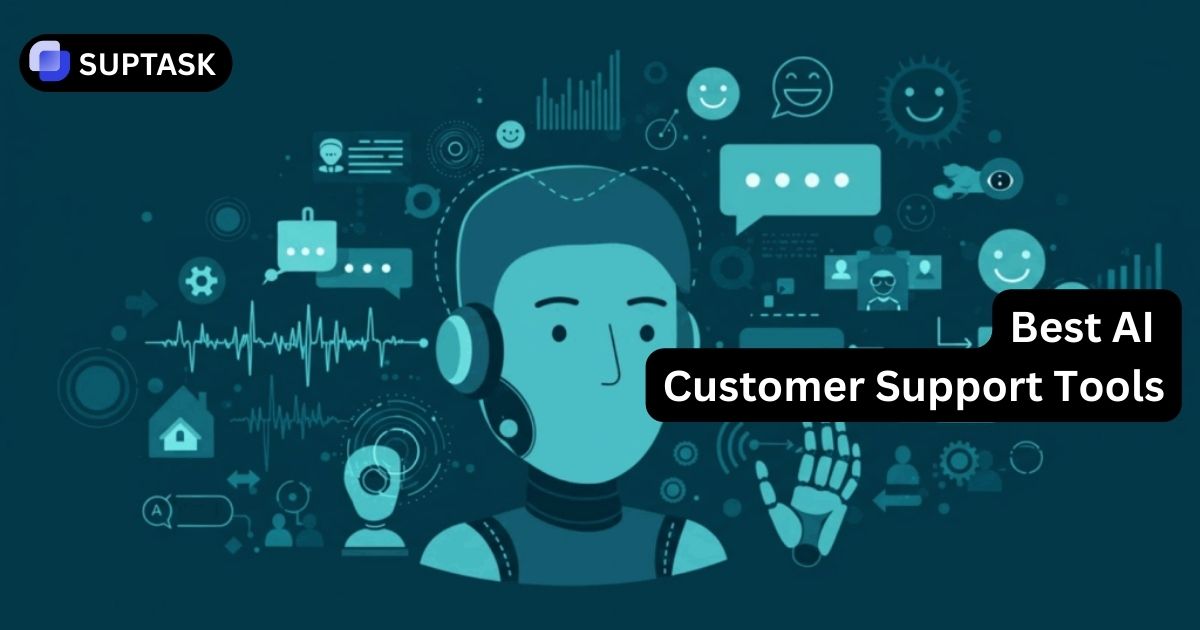We tested 50+ platforms. Only 15 made the cut. One lives where you already work.
Find Your Perfect Ticketing System in 30 Seconds
Answer 3 quick questions and we'll recommend the best fit
Where does your team spend most of their time?
What's your team size?
What's your biggest pain point?
Suptask
Based on your team's Slack usage and need to eliminate context switching
All 15 Platforms at a Glance
| Platform | Best For | Starting Price | Key Strength |
|---|---|---|---|
|
1
Suptask
|
Slack-Native Ticketing | Free / $7 | Zero context switching |
|
2
Salesforce Service Cloud
|
CRM-Centric Enterprise | $25/user | Complete customer 360° |
|
3
Zendesk
|
Comprehensive CX | $19/agent | Omnichannel excellence |
|
4
Jira Service Management
|
ITSM & DevOps | Free / $22 | Developer integration |
|
5
ServiceNow
|
Enterprise ITIL | Quote only | Complete IT backbone |
|
6
Zoho Desk
|
Best Value SMB | Free / $9 | Feature-rich ecosystem |
|
7
Freshdesk
|
Usability-Focused | Free / $15 | Intuitive interface |
|
8
HubSpot Service Hub
|
Marketing Aligned | Free / $15 | Unified customer platform |
|
9
monday.com Service
|
No-Code Workflows | $9/seat | Visual customization |
|
10
HappyFox
|
Customizable Help Desk | $29/agent | Flexible workflows |
|
11
LiveAgent
|
Live Chat Focus | Free / $9 | Real-time support |
|
12
Tidio
|
E-commerce | Free / $24 | AI chatbot conversion |
|
13
Help Scout
|
SMB Support | Free / $20 | Human-centric design |
|
14
Issuetrak
|
On-Premise Option | $27/user | Self-hosted control |
|
15
Atera
|
MSP & RMM | $149/tech | All-in-one IT platform |
Calculate Your Ticketing ROI
See how much time and money you could save with automation
Your Current Situation
Cost Factors
Suptask
The Only Ticketing System That Lives Where You Work
Watch the Magic Happen
Zero Setup
Install in 2 minutes. No training required. Your team already knows how to use Slack.
AI That Works
Automatically summarizes problems & solutions. Builds your knowledge base as you work.
Private & Secure
Handle HR, Finance, and sensitive tickets privately in DMs. Full audit trail included.
Join 5,000+ teams who stopped switching tabs
Salesforce Service Cloud
Best for: CRM-Centric Enterprise Service
The undisputed champion of unified customer data. If your service team needs to see every sales interaction, marketing touchpoint, and support history in one view, Salesforce delivers. Their new Agentforce AI can handle entire conversations autonomously.
Zendesk
Best for: Comprehensive Customer Experience
The gold standard for external customer support. Zendesk excels at managing conversations across email, chat, voice, and social media. Their marketplace offers solutions for every industry. The downside? Your internal teams still need a separate tool.
Jira Service Management
Best for: ITSM & DevOps Teams
Perfect marriage of IT service and software development. Seamlessly links support tickets to dev issues. If your team already uses Jira Software, this is a no-brainer. The free tier supports 3 agents with full features - unbeatable for small teams.
ServiceNow
Best for: Enterprise IT Operations
The heavyweight champion of enterprise ITSM. ServiceNow does everything - incident, problem, change management, plus asset tracking. It's powerful, expensive, and requires significant investment. For Fortune 500 IT departments, it's often the only choice.
Zoho Desk
Best for: Value-Conscious SMBs
Incredible features at an unbeatable price. Zoho Desk punches way above its weight class with enterprise features like Blueprint process builder and Zia AI. If you're already in the Zoho ecosystem, integration is seamless. Free for up to 3 agents.
Freshdesk
Best for: Intuitive Agent Experience
The most intuitive helpdesk on the market. Freshdesk prioritizes agent productivity with a clean interface and smart automation. Freddy AI handles routine tickets while agents focus on complex issues. Generous free plan supports 10 agents.
HubSpot Service Hub
Best for: Revenue-Focused Support
Where support meets revenue. Service Hub turns every ticket into an opportunity with deep CRM integration. Support tickets can trigger sales tasks or marketing campaigns. Perfect for SaaS companies where support drives retention and upsells.
monday.com Service
Best for: Visual Workflow Management
Not just a ticketing system - it's a complete Work OS. Build any workflow with drag-and-drop simplicity. Perfect for teams that want tickets, projects, and everything else in one visual platform. The flexibility is both its strength and weakness.
HappyFox
Best for: Customizable Help Desk
The Swiss Army knife of help desks. HappyFox adapts to any workflow with powerful customization. Unique unlimited agent pricing on higher plans makes it cost-effective for large teams. Strong Slack integration without being fully native.
LiveAgent
Best for: Real-Time Support
Master of real-time communication. LiveAgent's hybrid ticket stream brilliantly combines emails, chats, calls, and social messages in one chronological view. Built-in call center with IVR and unlimited recordings. Perfect for chat-heavy support.
Tidio
Best for: E-commerce Conversion
Built to convert visitors into customers. Tidio's Lyro AI chatbot learns from your FAQs and product catalog to handle 70% of inquiries automatically. Proactive engagement tools help capture leads before they leave. E-commerce focused features throughout.
Help Scout
Best for: Human-Centric Support
Refreshingly simple and human. Help Scout feels like a supercharged email client, not a complex ticketing system. Perfect for small teams that want to maintain a personal touch while scaling. No ticket numbers - just conversations with customers.
Issuetrak
Best for: On-Premise Requirements
The last bastion of on-premise ticketing. Issuetrak offers both cloud and self-hosted options for organizations with strict data residency requirements. Popular in government, healthcare, and finance. Perpetual licensing available for true ownership.
Atera
Best for: MSPs & IT Departments
The all-in-one platform for managed service providers. Combines ticketing with remote monitoring and management (RMM). System alerts automatically create tickets. Per-technician pricing (not per-device) makes it incredibly cost-effective for MSPs managing thousands of endpoints.
Head-to-Head Comparison
Select Tool 1
Select Tool 2
Stop Switching Tabs. Start Resolving Tickets.
Your team already lives in Slack. Why force them to work somewhere else? Suptask brings enterprise-grade ticketing to where collaboration happens naturally. No training. No adoption issues. Just results.
Try Suptask Free - Install in 2 Minutes












